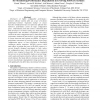Free Online Productivity Tools
i2Speak
i2Symbol
i2OCR
iTex2Img
iWeb2Print
iWeb2Shot
i2Type
iPdf2Split
iPdf2Merge
i2Bopomofo
i2Arabic
i2Style
i2Image
i2PDF
iLatex2Rtf
Sci2ools
ICSE
2005
IEEE-ACM
2005
IEEE-ACM
Main effects screening: a distributed continuous quality assurance process for monitoring performance degradation in evolving so
Developers of highly configurable performanceintensive software systems often use a type of in-house performance-oriented "regression testing" to ensure that their modifications have not adversely affected their software's performance across its large configuration space. Unfortunately, time and resource constraints often limit developers to in-house testing of a small number of configurations and unreliable extrapolation from these results to the entire configuration space, which allows many performance bottlenecks and sources of QoS degradation to escape detection until systems are fielded. To improve performance assessment of evolving systems across large configuration spaces, we have developed a distributed continuous quality assurance (DCQA) process called main effects screening that uses in-the-field resources to execute formally designed experiments to help reduce the configuration space, thereby allowing developers to perform more targeted in-house QA. We have e...
Entire Configuration Space | ICSE 2005 | Large Configuration Space | Software Engineering | Targeted In-house Qa |
| Added | 09 Dec 2009 |
| Updated | 09 Dec 2009 |
| Type | Conference |
| Year | 2005 |
| Where | ICSE |
| Authors | Cemal Yilmaz, Arvind S. Krishna, Atif M. Memon, Adam A. Porter, Douglas C. Schmidt, Aniruddha S. Gokhale, Balachandran Natarajan |
Comments (0)

